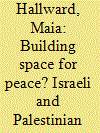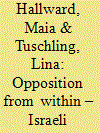| Srl | Item |
| 1 |
ID:
090861


|
|
|
|
|
| Publication |
2009.
|
| Summary/Abstract |
This article investigates the limitations of peace theory in comparing and contrasting strategies adopted by activist groups working to resolve conflicts of varying types in varying contexts. Using the case of seven Israeli and Palestinian peace and justice groups that remained active after the collapse of the Camp David negotiations and the outbreak of the Second Intifada, the article illustrates the benefits of a process-based approach to peacebuilding for examining how, why, and to what extent approaches used by these groups changed between 2004-05 and 2008. The findings highlight how domestic, regional, and international changes have affected the operation of peace and justice activists, and suggest that those interested in progress towards a negotiated peace agreement should not assume that past policy instruments will work in the current environment.
|
|
|
|
|
|
|
|
|
|
|
|
|
|
|
|
| 2 |
ID:
096964


|
|
|
|
|
| Publication |
2010.
|
| Summary/Abstract |
This paper explores the role of academic scholarship and practice in constituting, aggravating, and resolving the Israeli-Palestinian conflict. The first section of the paper examines how scholarly discourse and methods of analysis contribute to shaping (mis)understandings of on-the-ground conflict dynamics. To demonstrate this point, the paper first overviews conventional social science methods used in mainstream international relations (IR) scholarship that tend to reify, freeze and homogenize 'the conflict' as well as conflict parties and then uses a different scholarly approach-namely a processual, peace-studies-oriented methodology-that provides a very different 'picture' of the conflict, its parties and appropriate strategies of engagement in the pursuit of peace. The second section of the paper uses three brief case studies to demonstrate how Israeli and Palestinian academics help constitute 'the conflict' and its parties not only through their scholarship but also through their 'practice'. These examples also show the importance of re-evaluating analytical models to include contextual dynamics such as time, place and sources of available power as well as to recognize the diversity of Palestinian and Israeli views regarding the sources of-and best approaches for addressing-'the conflict'.
|
|
|
|
|
|
|
|
|
|
|
|
|
|
|
|
| 3 |
ID:
174603


|
|
|
|
|
| Summary/Abstract |
Protests in response to Israeli military action in the Occupied Territories have a long history in Israel. While such opposition movements in many countries are comprised of civil society activists, the dynamics of protest differ in Israel because of the country’s mandatory military service. From the 1980s to present day, former and current Israeli soldiers have used a wide range of methods, tactics, and strategies to challenge Israeli military actions. Using insights from nonviolent resistance theories, we examine how the approaches and goals of military opposition groups in Israel have changed over the past decades. Specifically, we develop a typology to explain why different types of protest arise from within the Israeli Defense Force that garner strong reactions – whether laudatory or derogatory – from the Israeli government and general public. The paper concludes with lessons learned for military opposition movements in the context of nonviolent resistance theory and practice.
|
|
|
|
|
|
|
|
|
|
|
|
|
|
|
|